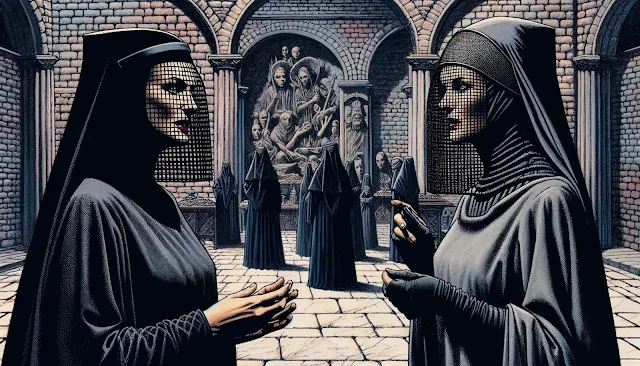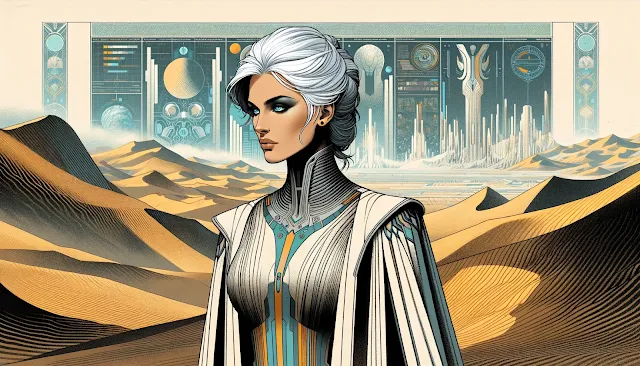From the desert-bound Fremen, whose survival-centric beliefs dictate their reverence for Arrakis, to the shadowy machinations of the Bene Gesserit and their strategic implantation of myths, we explore how spiritual belief systems are wielded by the powerful to steer the fate of individuals and civilizations.
At the heart of this cosmic chess game is Paul Atreides, whose reluctant ascent as a messianic figure, Muad'Dib, sets off a chain of events with unforeseen consequences, challenging the notion of religion as a benign force.
Through the lens of "Dune," (and Dune: Prophecy) we embark on a journey to unravel the multifaceted roles of faith, fervor, and the quest for control in a universe where the sacred and the sovereign are inexorably linked, inviting readers to ponder the profound implications of using spirituality as a tool in the eternal quest for power.
 |
| Concept design of the Gesserit Cult |
The Fremen and Ecological Religion
The Fremen's religious practices are deeply intertwined with the ecology of Arrakis. Their reverence for water is not only a survival tactic but also a sacred duty, encapsulated in rituals like the giving of one's "water to the tribe" upon death. This practice ensures every drop of moisture is preserved, reflecting a profound respect for the planet's scarce resources.The worship of Shai-Hulud, the sandworms, as physical manifestations of the divine, further exemplifies the Fremen's symbiotic relationship with their environment. These elements are not merely cultural quirks but essential strategies for survival in a hostile world, woven into the fabric of Fremen spirituality.
Herbert uses these practices to demonstrate how religion can evolve in response to environmental conditions, serving as a guiding principle for living in harmony with nature.
The Bene Gesserit and the Manipulation of Myth
The Bene Gesserit represent a more calculated use of religion. Their Missionaria Protectiva program is a form of cultural imperialism, designed to manipulate indigenous beliefs for their own protective ends. A pivotal example is the prophecy of the Lisan al-Gaib, or the "Voice from the Outer World," which Lady Jessica leverages upon her arrival on Arrakis. By positioning herself and Paul within the framework of this prophecy, Jessica secures the loyalty of the Fremen. This strategy underscores the Bene Gesserit's long-term planning and their deep understanding of the power of myth to shape societal structures.
Herbert uses the Bene Gesserit to explore the idea that religion can be engineered and deployed as a tool of control, a theme that resonates with historical instances of religious manipulation.
Paul Atreides: Messiah and Manipulator
Paul Atreides' transformation into Muad'Dib is perhaps the most personal and profound exploration of religion in "Dune." Initially, Paul is wary of the Fremen messianic expectations placed upon him. However, as he embraces his role as Muad'Dib, he uses the Fremen's beliefs to unite them against their common enemies.Paul's journey from skepticism to reluctant acceptance of his role as a religious figure is marked by his growing awareness of the power and danger of faith. His visions of a future jihad unleashed in his name illustrate the potential for religious fervor to escape the control of even those who wield it.
Herbert employs Paul's story to question the ethics of using religion for political ends, suggesting that the consequences of such actions can extend far beyond the intentions of their instigators.
How does Darwi Odrade use religion in the Dune novels?
Darwi Odrade, a significant character in Frank Herbert's "Dune" series, particularly in the later novels "Heretics of Dune" and "Chapterhouse: Dune," employs religion as a tool of statecraft and social control, continuing the series' exploration of the intersection between faith and power.As a Bene Gesserit Mother Superior, Odrade is deeply involved in the strategic manipulations of religious beliefs and cultural norms to advance the Bene Gesserit agendas.
Her approach to religion is pragmatic and calculated, seeing it not as a spiritual absolute but as a means to influence and manage diverse populations.
This is evident in how she handles the Rakian Priesthood and the worship of Leto II, the God Emperor, whose religious legacy still permeates the galaxy.
Odrade's strategy involves reshaping religious narratives to stabilize and unify societies under Bene Gesserit influence, ensuring compliance and minimizing resistance.
She recognizes the power of religious fervor and mythology in shaping human behavior and societal structures, leveraging this to maintain the hegemony of her order. Through her character, Herbert delves into the mechanics of religious manipulation, illustrating its effectiveness and potential perils as a governance tool.
Odrade's nuanced understanding of religion reflects a broader theme in the "Dune" series, where faith is often intertwined with political motives, highlighting the complexity and dual nature of religion as both genuine belief and a manipulable variable in the power equations of Herbert's universe.
The Unintended Consequences of Religious Control
The overarching narrative of "Dune" serves as a cautionary tale about the use of religion as a means to an end. While the Fremen, the Bene Gesserit, and Paul Atreides each employ religious elements for survival, protection, and power, respectively, their actions have far-reaching implications. The Fremen's ecological religion, while fostering a sustainable relationship with Arrakis, also isolates them from the broader universe.The Bene Gesserit's manipulations, though protective in intent, sow seeds of dependency and undermine the authenticity of local beliefs. Most tragically, Paul's messianic campaign, while initially a means of liberation, spirals into a galaxy-spanning conflict that he cannot control.
Through these examples, Herbert illustrates the dual nature of religion as both a unifying force and a potent tool for manipulation. "Dune" challenges readers to consider the ethical boundaries of influencing belief systems, highlighting the delicate balance between guidance and control.
Through these examples, Herbert illustrates the dual nature of religion as both a unifying force and a potent tool for manipulation. "Dune" challenges readers to consider the ethical boundaries of influencing belief systems, highlighting the delicate balance between guidance and control.
By weaving these themes into the fabric of his novel, Herbert offers a rich and complex exploration of the power dynamics inherent in the intersection of religion and politics, one that continues to resonate with readers decades after its publication.


















